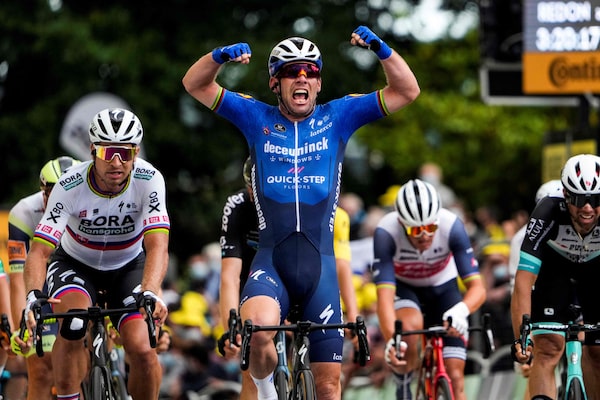
Deceuninck-Quick Step's Mark Cavendish celebrates as he crosses the finish line to win the fourth stage of the Tour de France on Tuesday.DANIEL COLE/AFP/Getty Images
This time, they were happy tears.
In October last year, Mark Cavendish posted an insignificant 74th place at the Belgian classic Gent-Wevelgem. Depressed and dejected, with his contract with the Bahrain McLaren team almost over, the sprinter from the Isle of Man suggested in an emotional postrace interview it could well have been his final race.
On Tuesday at the Tour de France, the tears of sadness made way for those of happiness after the “Manx Missile” posted a 31st stage win at cycling’s biggest event.
“Just being here is special enough. I didn’t think I would ever get to come back to this race,” said Cavendish, the greatest sprinter in the race’s history.
The 36-year-old veteran sat on the road and cried after his triumph in the fourth stage. He was congratulated by teammates, who worked hard in the stage finale to put Cavendish in an excellent position for the sprint.
“You just see what a great team this is. You’ve got the green jersey, the world champion Julian Alaphilippe coming to do the final pull just to try to catch the breakaway, putting everything in,” Cavendish said. “So many people didn’t believe in me but these guys do.”
After all the doubts about his future, Cavendish secured a new contract with his former Deceuninck-Quick Step team. He convinced manager Patrick Lefevere he could perform at the top level again but he was not expected to ride at the Tour and did not train specifically for the three-week race.
He received a last-minute call-up earlier this month, as a replacement for Sam Bennett, the best sprinter of last year’s Tour.
“Three weeks ago I would not have imagined this,” said Cavendish, who is back at the Tour for the first time since 2018.
Lefevere’s bet paid off in the town of Fougeres, where Cavendish had already won in 2015. With a perfectly timed burst of speed – he reached an average speed of 63 kilometres an hour in the last 500 metres – Cavendish edged Frenchman Nacer Bouhanni and Jasper Philipsen of Belgium.
Cavendish is second on the all-time list for the most stage wins behind Belgian great Eddy Merckx on 34. Cavendish’s previous stage win dated back to 2016.
Cavendish took a break from cycling after being diagnosed with the Epstein-Barr virus for the second time in 2018. The former world champion enjoyed a resurgence earlier this season with five stage wins after returning to Deceuninck-Quick Step.
Mathieu van der Poel kept the race leader’s yellow jersey with an eight-second lead over Alaphilippe ahead of Wednesday’s first time trial.
Riders staged a protest at the start of the 150.4-kilometre flat stage to complain about perceived dangerous racing conditions after a flurry of crashes in the previous days reignited the issue of road safety.
Having left the town of Redon in the western Brittany region to start Stage 4, the peloton rode at a moderate pace and all riders got off their bikes after about one kilometre. They waited silently for about a minute before hitting the road again.
After the crash-filled Stage 3, several riders have criticized race organizers for setting up what they considered a dangerous finale to a Tour stage, especially in the early days of the race when nervousness is at its highest level.
An early breakaway formed soon after the protest as Tour debutant Bret Van Moer and Pierre-Luc Périchon moved away from the pack. They collaborated well and had a maximum lead of more than three minutes before the peloton stepped up the pace.
Van Moer dropped Périchon with 14 kilometres left in a final shot at glory and produced a powerful effort to resist the peloton’s chase until the last 100 metres.